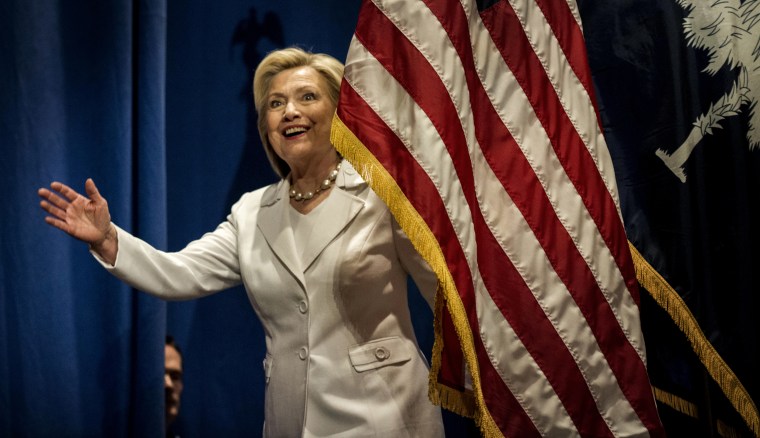Hillary Clinton is leading her nearest Democratic competitor by a whopping 60 points, and she holds the early general-election advantage against the top Republican White House contenders, according to a new NBC News/Wall Street Journal poll.
Seventy-five percent of national Democratic primary voters say Clinton is their first choice to win the Democratic presidential nomination – compared with 15% who pick Sen. Bernie Sanders, I-Vt., 4% who say former Sen. Jim Webb, D-Va., and 2% who select former Maryland Gov. Martin O’Malley.
RELATED: Jeb Bush surges to lead GOP pack in new 2016 poll
What’s more, 92% of Democratic voters say they could see themselves supporting her for the Democratic nomination, which is up six points since March.
Just 8% can’t see themselves backing her in the current poll, which was conducted right after Clinton formally kicked off her presidential campaign with a rally in New York City. (By contrast, former Florida Gov. Jeb Bush’s score among Republicans is 75-22% and Sen. Marco Rubio’s, R-Fla., is 74-15%.)
“Hillary Clinton continues to lap the field on the Democratic side,” said Democratic pollster Peter Hart, who conducted this survey with GOP pollster Bill McInturff.
McInturff adds that Clinton is in the “strongest and most advantageous” position for a non-incumbent running for his or her party’s presidential nomination in his lifetime working in politics.
Looking ahead to the general election, Clinton also leads Bush by eight points (48% to 40%), Rubio by 10 points (50% to 40%) and Wisconsin Gov. Scott Walker by 14 (51% to 37%).
RELATED: What 'Bernie-mentum' tells us about 2016
But the NBC/WSJ poll offers two cautionary notes about Clinton’s leads. One, 62% of Democratic primary voters want her to have a challenging primary to test her for the general election, signaling they don’t want a coronation to the nomination.
And two, the poll shows a generic Democrat defeating a generic Republican in the 2016 presidential race by just three points, 39% to 36%, suggesting that the general election will be competitive.
“Like the [Max] Scherzer no-hitter or the U.S. Open, the outcome won’t be known until the final pitch or the final putt,” Hart says.
Obama’s job-approval rating: 48%
Also in the poll, President Obama’s job-approval rating stands at 48% among all adults, which is unchanged from April.
But that comes amid renewed pessimism about the state of the U.S. economy. Just 37% of Americans say they’re satisfied with the economy – down eight points since January.
Forty-six percent say they’re more optimistic about the economy – down two points from March.
In addition, the poll finds 45% of American adults believing that the economy has improved and giving Obama some credit for it; another 17% agreeing that the economy has improved but not giving the president much credit; and 37% saying the economy really hasn’t improved.
Measuring how to combat ISIS: With U.S. troops or without?
And turning to foreign affairs, the poll shows 28% of Americans favor sending U.S. troops into Iraq “for as long as it takes” to combat ISIS.
Thirty-two percent support sending U.S. troops for only a short period of time to allow the Iraqi army to take over. And 38% don’t want to send any U.S. troops into Iraq.
The NBC/WSJ poll was conducted June 14-18 of 1,000 adults (including nearly 400 by cell phone), and it has an overall margin of error of plus-minus 3.1 percentage points.
The margin for error of the 830 registered voters is plus-minus 3.4 percentage points, and the margin for error of the 247 Democratic primary voters is plus-minus 6.2 percentage points.
